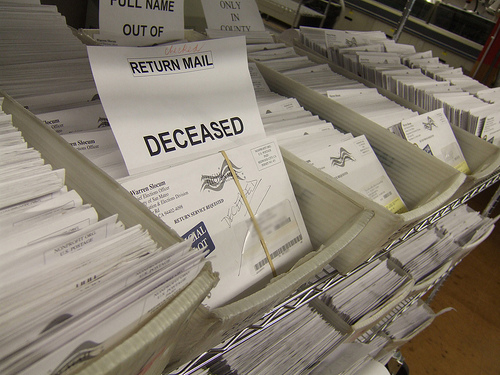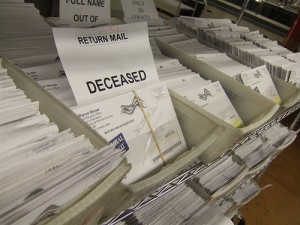Executive
Dead people voting

Dead people voting is no joke. 1.8 million currently enrolled voters are dead. But even checking the voter rolls becomes a federal case. Result: voters stay on the rolls long after they are dead (or moved out), and someone else can vote in their places.

Baskets of ballots mailed to the dead and returned. Why didn't anyone strike those names from the voter rolls? Photo: Joe Hall, CC BY 2.0 Generic License
Dead people voting: a big problem
The Pew Research Center, whom no one ever mistakes for a conservative think tank, released this report today. The title of the report speaks volumes:
Inaccurate, Costly, and Inefficient: Evidence That America’s Voter Registration System Needs an Upgrade
The most sensational thing that Pew found is that 1.8 million voters nationwide are dead. But that’s not all:
- Approximately 24 million—one of every eight—active voter registrations in the United States are no longer valid or are significantly inaccurate.
- Approximately 2.75 million people have active registrations in more than one State.
(See also this report in the New York Daily News.)
The Pew report also found that 51 million eligible voters have not registered. So the problems with the voting systems go both ways.
The problem, says Pew, is that county clerks still register voters on paper, and keep paper records, in an era when more people than ever do not live their entire lives in one precinct, one town, or even one State. This, they say, is especially true of our soldiers and sailors and Marines and airmen and pilots. The government reassigns them all the time, and sometimes they can’t get absentee ballots on time.
Your editor has direct experience as an election inspector. At any polling place in New Jersey, the senior poll worker has the title of “judge,”: and the next junior poll worker of the opposite Party has the title of “inspector.” In New Jersey, the only way that a voter need identify himself is to sign his name, so that the election judge, inspector, or other poll worker can compare the signature. If the voter’s name is not in the roll, the poll workers ask for a driver’s license and then look up a street index to find the voter’s correct district. If the voter has moved into the district recently, the poll workers hand him a provisional ballot so that the higher-up officials in the county clerk’s office, or the State Division of Elections, can sort out whether that voter is registered or not.
Your editor recalls too many cases to count, in which a voter showed up to vote, and then asked,
Why is my father still on your rolls? He’s been dead these last five years!
Or,
He moved away six years ago!
Poll workers can mark the rolls before they turn them back over to the town clerk. But nobody checks them. Your editor knows this after seeing the same names reappear and re-re-appear on the voter rolls in election after election that takes place afterward.
Pew recommends that county clerks start registering people on-line, and cross-checking their voter rolls with driver’s license and other records. They cite Maricopa County, Arizona as a model of efficiency and accuracy. (That should impress anyone. Maricopa County is where Joe Arpaio has held the Sheriff’s office for twenty years.)
But Pew will not talk about the obvious fraud: dead people voting, people voting in every State (more than one) in which they are still on the rolls, etc. Only once does Pew even mention the word fraud in their twelve-page report. True, they admit that the “antiquated” voting system is susceptible to fraud. But they say nothing about whether fraud is taking place, or how much.
Dead people voting: nothing new
The spectacle of dead people voting is not new. Peter Hannaford writes in The American Spectator that “dead people voting” has decided elections as far back as 1948. (Such fraud might have helped John F. Kennedy “carry” Illinois in 1960 and thus win the Presidency.) What is new is the brass that those seeking to commit election fraud now show.
Ballotpedia documents several episodes of dead people voting and other types of fraud going back eight years. In most cases until recently, “dead people voting” works like this: A voter registers legitimately, casts several votes, and then dies. Then a local ward heeler recruits someone to vote in his place. But modern ward heelers are more brazen: they literally register the dead to vote. (They also register non-existent people, including some of Walt Disney’s and George Lucas’ characters, to vote in many States.) Dead people voting also happened in this year’s primaries, in New Hampshire and in South Carolina. The notorious James O’Keefe caught district board members (“poll workers”) in New Hampshire red-handed handing out ballots in the names of the dead. South Carolina’s Attorney General developed a case involving at least 600 dead people voting:
We just recently learned that there are over 900 individuals died before the election and at least 600 of those individuals died outside window when absentee ballot could be sent. So we know for a fact that there are [dead people voting] in South Carolina.
Dead people voting: the cover-up
The United States Department of Justice is not taking this as seriously as it should. To the contrary, it is covering up. Worse yet, it is trying to keep dead people voting.
Their behavior, in challenging a new law that says that a voter must identify himself with his photograph before casting a ballot, makes zero sense apart from this motive. Unless an election judge or inspector asks a voter to identify himself in some way, anyone could show up to vote and give a dead person’s name, and neither that election judge nor any of her colleagues would be any the wiser.
The Justice Department has its enablers in the mainstream media. Andrew Rosenthal of The New York Times is the prize example. On November 7, 2011, he wrote twice to say that voter fraud does not happen often enough to justify asking for ID. And to the evidence of hundreds of dead people voting in South Carolina, he said but two words: “poo” and “poo.”
Nine hundred, or even six hundred, dead people voting are nine hundred or six hundred dead people too many voting. Candidates, Constitutional amendments, initiatives, and referenda can win or lose on such margins. Rosenthal should know this. His favorite Presidential candidate, Albert A. Gore Jr., lost by a similarly small margin in Florida.
Now the evidence is in. The jig is up. Nearly two million of the dead are still on the voter rolls. Purge the rolls; solve the problem. Anyone who stands in the way of that, is either a ward heeler or allied with one. It’s that simple.
ARVE error: need id and provider
ARVE error: need id and provider
[amazon_carousel widget_type=”ASINList” width=”500″ height=”250″ title=”” market_place=”US” shuffle_products=”True” show_border=”False” asin=”B00375LOEG, 0451947673, 0800733940, 0062073303, 1595230734, 1936218003, 0981559662, 1935071874, 1932172378″ /]
Terry A. Hurlbut has been a student of politics, philosophy, and science for more than 35 years. He is a graduate of Yale College and has served as a physician-level laboratory administrator in a 250-bed community hospital. He also is a serious student of the Bible, is conversant in its two primary original languages, and has followed the creation-science movement closely since 1993.
-

 Accountability2 days ago
Accountability2 days agoWaste of the Day: Principal Bought Lobster with School Funds
-

 Constitution2 days ago
Constitution2 days agoTrump, Canada, and the Constitutional Problem Beneath the Bridge
-

 Executive23 hours ago
Executive23 hours agoHow Relaxed COVID-Era Rules Fueled Minnesota’s Biggest Scam
-

 Civilization22 hours ago
Civilization22 hours agoThe End of Purple States and Competitive Districts
-

 Civilization4 days ago
Civilization4 days agoThe devil is in the details
-

 Executive4 days ago
Executive4 days agoTwo New Books Bash Covid Failures
-

 Civilization4 days ago
Civilization4 days agoThe Conundrum of President Donald J. Trump
-

 Executive4 days ago
Executive4 days agoThe Israeli Lesson Democrats Ignore at Their Peril







The Pew Research Center report is about an inefficient voter registration system. Maybe they can tackle the dead people voting problem on their next report.
[…] Dead voters. […]